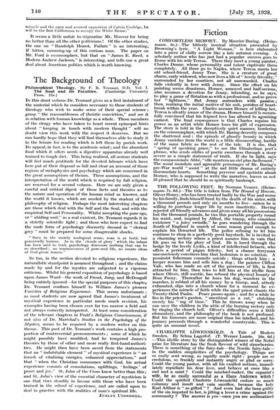Fiction
COMFORTLESS MEMORY. By Maurice Baring. (Heine- mann. 6s.)—The bitterly ironical situation presented by Browning's lyric, " A Light Woman," is here elaborated into a piece of chilly sorrow like a late autumn evening. A scholarly author who has just had a popular success goes to Rome with his wife Teresa. There they meet a young painter, Charles Donne, whose personality and talent captivate them completely. All three go to Naples, where Teresa meets her old school-friend, Jenny True. She is a creature of great charm, early widowed, who now lives a life of " lovely frivolity," surrounded by her courtiers, not all unrewarded. Charles falls violently in love with Jenny. Since the effect on his painting seems disastrous, Horace, annoyed and half-serious, also assumes a devotion for Jenny, intending, as he says, to play a game of flirtation as with a professional, and so prove her lightness." But Jenny surrenders with passion ; then, realizing the initial motive of his suit, perishes of heart- break within the year. Charles accuses Horace of killing her, Teresa is silently aware of the drama, Horace himself is mourn- fully convinced that his feigned love has altered to agonizing earnest. The final consequence is that Charles regains his power as an artist while Horace loses his gift of expression. The story is told in the deceptively quiet manner, bordering on the eominonplace, with which Mr. Baring decently composes the shattered soul : the episode of ghostly beauty in which Jenny vanishes from the world is a little disconcerting, hardly of the same fabric as the rest of the tale. It is she, that " spring of speaking grace," to use the Elizabethan poet's phrase, who sends eddies of poetic sweetness through a story severe as a simple statement of truth. If she be light, says the compassionate Abbe, " elle montera au ciel plus faeilement. ' The usual mondain and agreeable personages of Mr. Baring's pre-War world assist ' at the sad little drama of entirely disconsolate hearts. Something perverse and egotistic about Horace, who is supposed to write the narrative, leaves us not ill-pleased that he should be so spiritually bankrupt.




































 Previous page
Previous page